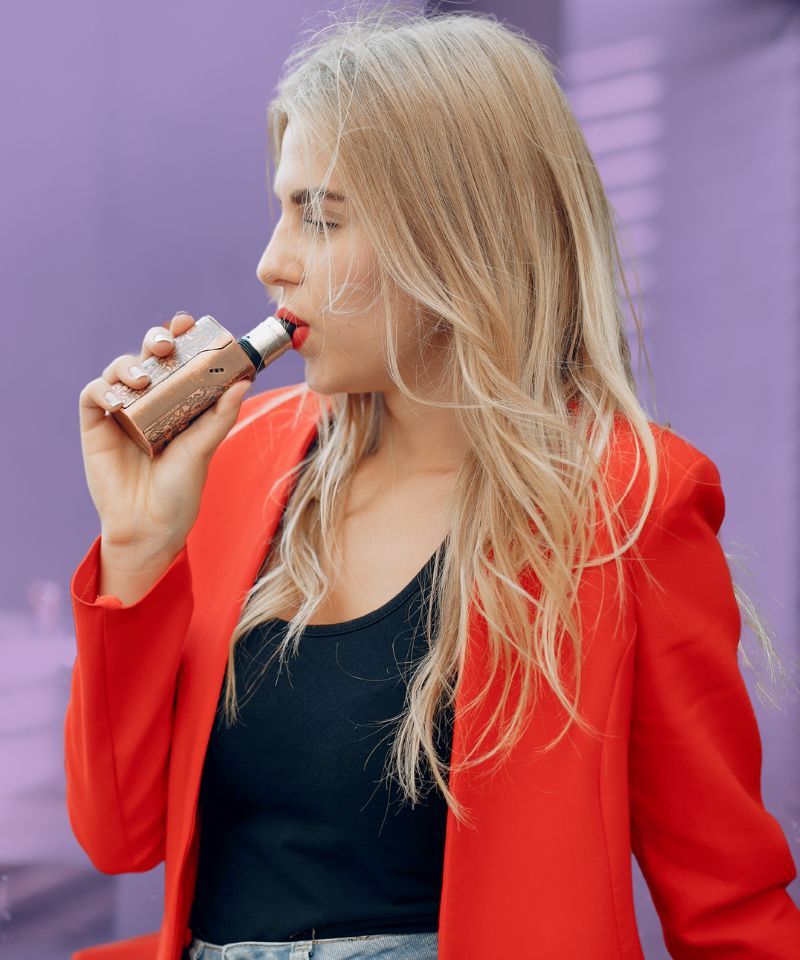While vaping hasn’t been directly linked as a cause of acne, some components in vape juice can contribute to the formation of this inflammatory skin condition and exacerbate active acne.
Additionally, vaping can also cause acne indirectly, as it can reduce the body’s natural ability to fight off bacteria and viruses, including the acne-causing bacteria that live on the skin.
Therefore, if you think that vaping might be a healthier alternative to smoking, your skin certainly begs to differ.
In this article, I will discuss all the ways vaping can cause acne and how to prevent it.

What Causes Acne?
Acne is an inflammatory skin condition that occurs when hair follicles become clogged with oil and dead skin cells.
It commonly appears on the face, chest, shoulders, back, and butt, and can be non-inflamed in the form of blackheads and whiteheads, or inflamed in the form of pustules, papules, and cysts.
Acne can be caused by various factors, including hormonal changes, genetics, diet, stress, and certain medications.
However, the formation of acne can be attributed to four key factors:
Oil: Overproduction of sebum, an oily substance secreted by the skin’s oil glands, can clog pores.
Dead Skin Cells: Dead skin cells that should naturally shed from the skin’s surface mix with the oil stuck inside the pores, contributing to the plug.
Bacteria: Cutibacterium acnes, a strain of bacteria that lives on the skin, finds its way inside the pores, where it begins to feed on the plug of cellular debris and multiply.
Inflammation: The body’s inflammatory response to the overgrowth of bacteria in the plug causes redness, swelling, and pus.
Can Vaping Cause Acne?
Vaping, or the use of electronic cigarettes, has become increasingly popular in recent years.
It is often marketed as a safer alternative to traditional smoking, but research is still ongoing about its long-term health effects.
One potential side effect of vaping that has been explored is its impact on skin health and the development of acne.
While more studies are needed to fully understand the relationship between vaping and this inflammatory skin condition, some research suggests that chemicals in vape juice may contribute to acne formation.
While vaping is unlikely to cause acne on the body, it can affect the skin on the face, particularly around the mouth and chin, as the vapor from the e-cigarette tends to make contact with this area.
6 Ways Vaping Contributes to Acne
Directly or indirectly, there are several ways that vaping can lead to acne:
Chemicals in Vape Juice Compromise The Skin Barrier
Vape juice contains various chemicals, including propylene glycol and vegetable glycerin, that can disrupt the skin’s barrier.
These toxins can put your skin under oxidative stress, increasing the amount of free radicals in the body, which interact with the skin cells, causing damage to cellular structures, proteins, and DNA.
This can lead to inflammation, irritation, and a weakened skin barrier.
The skin barrier protects the skin from external irritants, bacteria, and pollutants.
When compromised, these pathogens can more easily penetrate the skin and cause infections, allergic reactions, and inflammatory conditions.
The resulting chronic inflammation can worsen skin conditions such as acne, rosacea, and psoriasis.
Nicotine in Vape Juice Increases Oil Production
Nicotine is a highly addictive chemical found in tobacco products and is also present in many vape juices.
Studies have shown that nicotine can not only increase the production of sebum, the oily substance that contributes to clogged pores but can also change its composition and cause it to oxidize, making it more likely to get stuck inside the pores.
The reason for this is that our oil-producing glands are sensitive to acetylcholine, a neurotransmitter that is released when nicotine enters the body.
Acetylcholine leads to cellular differentiation and induces hyperkeratinization, a process where dead skin cells become stickier and more likely to remain stuck inside the pores instead of shedding from the skin’s surface.
Additionally, acetylcholine also influences the chemical structure of our natural oil and decreases antioxidant components in it, which leads to peroxidation or oxidation of the oil.
This results in a thicker, stickier, and more comedogenic substance that is more likely to clog pores and contribute to acne formation.
Oils in Vape Juice Clog The Pores
Besides nicotine affecting the chemical composition of natural skin oil and making it more likely to clog pores and contribute to acne formation, the oils in vape juice can also directly clog pores and exacerbate acne.
When you exhale the vapor from an e-cigarette, it inevitably lands on your skin and leaves behind a thin film of residue on the surface.
This residue which contains various oils used in the vape juice, combines with dead skin cells and bacteria already present on the skin’s surface to further contribute to clogged pores.
Vegetable glycerin and propylene glycol, common ingredients in vape juice, have high molecular weights and are known to be comedogenic, meaning they can clog pores and cause acne.
Flavorings and Additives in Vape Juice May Trigger Allergic Reactions
Some flavorings and additives in vape juice, such as cinnamon, vanilla, and coconut oil extracts, can potentially trigger allergic reactions, leading to acne-like breakouts, rashes, and hives.
Additionally, chemicals such as nickel and chromium, which are commonly found in the heating coils of e-cigarettes, can trigger allergic reactions when they come into contact with the skin and cause permanent conditions such as contact dermatitis characterized by red, itchy, and inflamed patches on the skin, often resembling a rash or acne-like breakouts.
Poor Oxygenation Prolongs Acne Healing Time
Smoking, including vaping, can reduce oxygen delivery to the skin due to causing vasoconstriction or narrowing of blood vessels.
This leads to decreased oxygen and nutrients supplied to skin cells to aid in repair, which can prolong acne healing time and make existing blemishes look more inflamed.
Additionally, the longer acne persists on the skin, the more likely it is to leave scars and pigmentation marks.
Therefore, by prolonging inflammation, vaping can not only worsen existing acne but also increase the chances of post-inflammatory hyperpigmentation and acne scarring.
Hormonal Fluctuations Triggered by Vaping May Aggravate Acne
Nicotine has been shown to affect hormone levels in the body, particularly cortisol, insulin, and male sex hormones such as testosterone.
When vaping, the nicotine present in vape juice can cause temporary spikes in these hormones, which then stimulate the oil-producing glands in various complex processes, leading to increased oil production and clogged pores.
This can aggravate acne and make it more difficult to control.
It can also cause severe inflammation in the body and delay the healing of the inflamed lesions.
Tips for Managing Acne While Vaping

While quitting vaping is probably the best way to prevent acne, there are methods to maintain clear skin and reduce the severity of this inflammatory condition while continuing to vape.
Here are some tips to help manage acne while using e-cigarettes:
Have a Complete Skincare Routine
A complete skincare routine that targets acne from the outside is one of the most important aspects of treating this inflammatory condition and maintaining clear and healthy skin.
Here are all the products you need for a complete skincare routine that fights acne:
Cleanser: A gentle, non-drying cleanser will help remove impurities accumulated on the skin’s surface throughout the day, including oils from vape juice that have stuck to the skin.
Exfoliator: Use a gentle exfoliator to remove dead skin cells and unclog pores. Look for chemical exfoliants with ingredients such as salicylic acid or glycolic acid, which can help keep pores clear of accumulation of cellular debris and chemicals in vape juice and prevent new breakouts.
Retinoid: Consider incorporating a retinoid into your skincare routine, as it helps regulate oil production and prevents dead skin cells from clogging pores.
Moisturizer: Use a lightweight, non-comedogenic moisturizer to hydrate the skin without adding excess oils that can contribute to acne formation.
Sunscreen: High SPF protects the skin from UV damage and free radicals in vape juice, which stick to the skin and impair cell DNA, leading to inflammation.
Drink Plenty of Water
Water improves kidney function, which aids in flushing out toxins, including those present in vape juice, from the body.
Additionally, drinking plenty of water also helps improve lymphatic function, enabling the body to eliminate waste, including the accumulation of bacteria, viruses, and artificial hormones from foods and medicine we consume daily.
Lastly, water is vital for maintaining skin hydration, as it helps carry nutrients and oxygen to the skin cells, keeping them plump and less susceptible to inflammation.
Eat Antioxidant Foods
Incorporating antioxidant-rich foods into your diet can help combat the effects of oxidative stress caused by vaping.
Fruits and vegetables such as berries, leafy greens, and citrus fruits are high in antioxidants such as vitamins C and E, which can help neutralize free radicals present in vape juice that contribute to skin inflammation and accelerate healing, which can help prevent acne scarring.
Consider Quitting Vaping Altogether
While managing acne while vaping is possible, quitting altogether may be the most effective solution for achieving clear, healthy skin.
Not only will quitting vaping improve your overall health and reduce your risk of developing respiratory illnesses and other chronic diseases, but it can also help regulate hormone levels, reduce inflammation, and promote skin function.
Additionally, quitting vaping means avoiding the harmful chemicals present in vape juice and their potential effects on the skin, such as clogging pores, triggering allergic reactions, and delaying acne healing.
Quitting also eliminates the risk of developing nicotine dependence, which can lead to decreased stress levels and cortisol spikes.
Overall, quitting vaping offers numerous benefits for your skin, overall health, and well-being, and it is definitely worth considering.

My name is Simone and I am a certified skin specialist. I created this website to teach my readers how to take great care of their skin and I also like to occasionally share my honest opinions on skincare products I’ve tried. You can learn more about me here.
